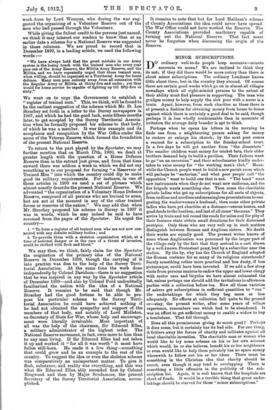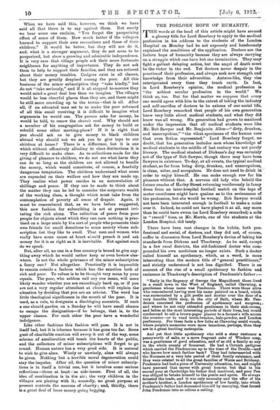MINOR SUBSCRIPTIONS.
DO ordinary well-to-do people keep accounts—minute accounts we mean? We are inclined to think they do not; if they did there would be more outcry than there is about minor subscriptions. The ordinary Londoner knows little about them, but in the country they abound. Of course there are certain good works which go on in almost all villages nowadays which all right-minded persons to the extent of their ability must find pleasure in supporting. The man who grudges money to help supply the sick poor with a nurse is a brute. Apart, however, from such charities as these there is at present a fashion for obtaining money from house to house against which there is certainly a good deal to be said, though perhaps it is less wholly condemnable than in moments of irritation the average daily breeder is apt to think.
Perhaps when he opens his letters in the morning he finds one from a neighbouring parson asking for money to restore or enlarge his church; by the next post comes a request for a subscription to the Sunday-school treat. In a few days he will get another from "the dissenters." The smaller children want money for cricket bats, their older brothers demand help to build a pavilion. Their fathers want to go "on an excursion " and their schoolmaster kindly under- takes to raise money for " the working men's club." Mean- while the Church people want to build anew parish room which will perhaps be "sectarian," and what poor people call "the opposition " want to build one that is not. " The baud " want new instruments when they do not want new uniforms, and the fire brigade wants something else. Then come the charitable private ladies who get up subscriptions for all sorts of objects, from endless and needless and meaningless presentations to emi grating the washerwoman's husband; then come other privet.) ladies who have pet charities at a distance—rescue homes, and good deeds to the heathen; and last of all come " the nuns." They arrive by train and toil round the roads for miles and for pity of their footsore state obtain small donations for their distressed protegees. Only those who are very well up in such matters distinguish between Roman and Anglican sisters. No doubt their works are equally good. The present writer knows of some whose Anglicanism was presumed by the larger part of the village only by the fact that they arrived in a cart drawn by a well-known Protestant pony, lent by a subscriber near the station. By the by, why has the Church of England adopted the Roman costume for so many of its religious sisterhoods? Surely something rather more practical and less dusty, if less picturesque, could have been invented. If we add a few stray visits from persons anxious to endow the upper and lower clergy with motor cars and bicycles we have almost exhausted the list, unless perhaps one should add the invitations to afternoon parties with a collection before tea. Now all these varieties of eskers get subscriptions in sufficient quantities to " run " the undertakings for which they beg more or less adequately. No efforts at collection fall quite to the ground or—stay, the present writer, after some years of village experience, remembers one which had to be abandoned. It was an effort to get sufficient money to enable a widow to buy a tombstone. That fell through.
Does all this promiscuous giving do much good ? Perhaps it does some, but it certainly has its bad side. For one thing, it fritters away the forces of charity and militates against all local charitable invention. The charitable man or woman who would like to try some scheme on his or her own account which would, he or she believes, benefit his or her neighbours or even would like to help them privately has no spare money wherewith to follow out his or her ideas. There must be something in the Christian idea that charity should be secret, even though it may tend to overlapping. There is something a little offensive in the publicity of the sub- scription list. Again, it is well known that the hospitals are short of funds. It would be a terrible thing that great under- takings should be starved for these "minor subscriptions." When we have said this, however, we think we have said all that there is to say against them. But surely we hear some one exclaim, " You forget the pauperizing effect of some of them. How much better if the villagers learned to support their own recreations and those of their children." It would be better, but they will not do it, and, what is a stronger argument, they do not seem to be pauperized, but show a growing and admirable independence. It is very rare that village people ask their more fortunate neighbours for anything of importance. They do not ask them to help to support their families, and they are reticent about their money troubles. Cadgers exist in all classes, but they are greatly despised among the poor. All this business of the minor subscription they " take kindly," but do not " take seriously," and if it all stopped to-morrow they would mind a great deal less than we imagine. The villages would be less cheerful places than they are, and there might be still more crowding up to the towns—that is all. After all, if an educated man set to to make the poor ashamed of all this small receiving it is difficult to imagine what arguments he would use. The parson asks for money, he would be told, to renew the church roof. Why should not a member of his congregation ask for money to build or rebuild some other meeting-place ? If it is right that you should ask us to give money to black children abroad why should not we ask you to give toys to our children at home ? There is a difference, but it is one which without offensively alluding to class distinctions it is very difficult to make clear. As to collections made for the giving of pleasure to children, we do not see what harm they can do so long as the children are not allowed to handle the money, which would constitute, of course, a fearfully dangerous temptation. The children understand what sums are expended on their welfare and bow they are made up. They realize what power resides in an accumulation of shillings and pence. If they can be made to think about the matter they can be led to consider the corporate wealth of the working class, a thought which must take from the contemplation of poverty all sense of despair. Again, it must be remembered that, as we have before suggested, this new fashion for subscribing is not at present irri- tating the rich alone. The collection of pence from poor people for objects about which they can care nothing is prac- tised on a large scale by the sort of people who persecute their own friends for small donations to some society whose sub- scription list they like to swell. That men and women who really have some cause at heart should preach it and ask money for it is as right as it is inevitable. Not against such do we speak.
But, after all, no one in a free country is bound to give any- thing away which he would rather keep or even bestow else- where. Is not the whole grievance of the minor subscription a fancy one ? Not altogether. Practically it is impossible to remain outside a fashion which has the sanction both of rich and poor. To refuse is to be thought very mean by your equals. The poor, who seldom call any one mean, will more likely wonder whether you are exceedingly hard up, or if you are not a very regular attendant at church will explain the situation by deciding that you are an atheist. The word has little theological significance in the mouth of the poor. It is used, as a rule, to designate a disobliging eccentric. If such a one should garden on a Sunday be will have small chance to escape the designation—if he belongs, that is, to the upper classes. For each other the poor have a wonderful indulgence.
Like other fashions this fashion will pass. It is not in itself bad, but it is irksome because it has gone too far. Some gust of charitable emotion will sweep it out of the way, some scheme of amelioration will touch the hearts of the public, and the collectors of minor subscriptions will forget to go round. Human nature has a very good side. It is natural to wish to give alms. Wisely or unwisely, alms will always be given. Nothing but a terrible moral degeneration could stay the impulse. After all, the question of minor subscrip- tions is in itself a trivial one, but it involves some serious reflections—three at least—as side-issues. First of all, the idea of combination is in the air; the very children in the villages are playing with it; secondly, no great purpose at present controls the sources of charity ; and, thirdly, there is a great deal of loose money going begging.



















































 Previous page
Previous page